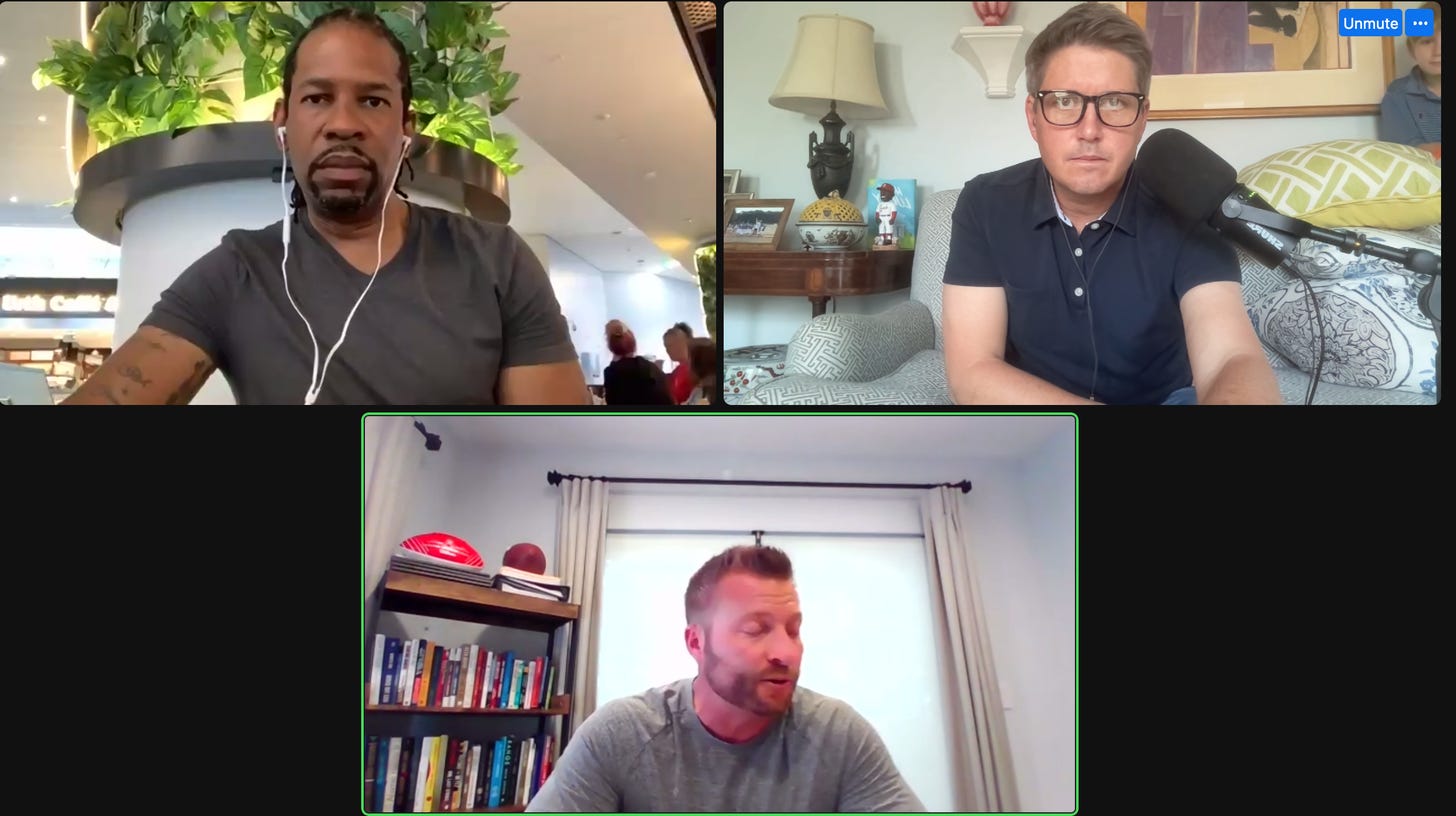Volume 4, Issue 7: Bob Forsch
"Sixteen years of remarkable consistency, an approach that hasn't changed once over the decades."
Here is a button where you can subscribe to this newsletter now, if you have not previously done so. I do hope that you enjoy it.
There’s a guy in Charlotte who brings typewriters into the press box for every game.


I know that typewriter: I used to have that same typewriter. I love that man so much and sometimes worry that every time I write on this laptop, I am somehow betraying him.
But even writing on a laptop can seem archaic now.
This will probably not come as a surprise to you, but one of my favorite writers growing up was Andy Rooney. Rooney is of course most famous for being the cranky old man commentator on “60 Minutes,” and with good reason: He was on that show, one of the most popular television programs on the planet, for 33 years. His TV commentaries were always a little bit hit-or-miss, one of the earliest examples of a writer letting the medium slowly erode away their voice, of allowing the ease and necessary simplicity of television to make their arguments less complex, easier to digest, more prone to hot takes and clipable quips. Rooney was an empathetic enough writer to not say something as stupid as his infamous Kurt Cobain commentary, but when you’re on television, and you have a persona to uphold, empathy and an understanding of perspectives outside your own is often one of the first things to go. Rooney lost millions of people as the years wore on, understandably, though he was always open-minded even about his failures: He dedicated the entire next commentary after the Cobain controversy reading letters telling him why he was wrong, andhe ultimately came around to agreeing with them.
But as a writer, in his prime, Rooney was terrific. He was a clean, unfussy writer, straightforward, matter-of-fact, funny and extremely observant. (I always liked “if dogs could talk, it would take a lot of the fun out of owning one” and “nothing in fine print is ever good news.”) His early writings as a correspondent covering World War II for The Stars & Stripes are sharp, focused and unsparing. (He was particularly deft at calling out both Patton and Hemingway.) He was the sort of writer I inherently admire: Someone who doesn’t make a big thing of it, someone who just sits down, writes all the time and then, when they’re done, writes some more. “Writers don’t retire,” he said in his final commentary, and then died one month later.
Rooney seems like the type of guy who wrote on a typewriter forever—and he certainly loved his typewriters—but he didn’t. He eventually ceded to the obvious and recognized that computers were a better, more efficient tool for writers, particularly ones working on larger projects. (It remains incredible to me that 100,000-word books were written on typewriters. I’m in the final stages of the next novel right now, and I email the whole thing to myself every 1,000 words out of extreme caution. The idea of losing the whole thing because of, like, a particularly strong wind is horrifying.) But the problem with computers is that they’re always becoming obsolete as well. “I’m reluctant to admit that I’m writing this on a Toshiba T3200SX computer,” he wrote. “Evidence of the swift passage of time is pressed on me often now because people come in my office and ask me where I got the old computer.”
The problem with everything, as I get older, is that everything eventually turns into an old computer.
Because, as I reach the second half of my 40s, I realize that, in Internet time, I am Andy Rooney and the man with the Wite-Out. I write for several publications, and every single one of those offices uses Slack to communicate amongst its employees and freelancers. But I refuse to use Slack. I believe that Slack is an evil program, actually, one that exists solely to sever that last remaining thread between real life and work life. Everyone I know on Slack hates it—it’s why that Slack commercial, one that sure seems to describe a dystopian nightmare of a corporate future, upset everyone who saw it; simply hearing that Slack notification sound outside its usual context made their eyes start twitching—because what companies (and Slack) call “connectivity,” the rest of us call “being followed around by our workplaces wherever we go.” So I refuse. I do not have a Slack account. I will not sign on. If you need me, I am very available by email. I have been working on my email skills and efficiency for more than 25 years now. I am one of those Email Box Zero freaks. I’m very good at email. That works just fine for me. I will not be changing. Ever.
Microsoft Word is another example. It is an expensive, declining, constantly crashing program operated by a company that I otherwise have no use for. None of my editors use it: Whenever I file a story to them, they immediately cut and paste it into a Google Doc, like normal people. But I will never write in a Google Doc; I’d use a typewriter first. I will use that stupid, incoherent, forever-broken Microsoft Word app until they finally cry uncle and stop making it. And I’ll probably keep using it then too, just me and my sad little dead word processing program that no one else can even access but me, writing little haikus about Rick Ankiel to myself, which is probably where all this was all ultimately going anyway.
It’s all the same stuff I’ve been using for 20 years, stuff it’s a little surprising they all still make. I still make lists and notes using Steno pads. I still keep score at baseball games—they’re going to have baseball games again soon, by the way—using the same C.S. Peterson’s Scoremaster book I’ve been using since my mother used it to keep score at the Little League games my Dad coached when I was eight. I will use Apple products for the rest of my life even though I know they’re all getting worse. I buy the exact same running shoes every time I need new ones—I buy 10 pairs at a time, in case they ever change them—I mark my Cardinals wall calendar with Ws and Ls every day like I did when I was six, I wear flex fit baseball caps rather than fitted ones, I still use plug-in headphones rather than Bluetooth. All those little consumerist things, all stuck in the consumerist culture in which I initially encountered them. And we haven’t even gotten into the fact that if you email me to respond to this newsletter, I will be writing you back from a Yahoo account.
This is what getting old is, I think: Being insistent upon hanging onto the way you’ve always done things even though it’s wrong—even though you know it’s wrong. But that is also part of being human, having something that you hold to, a security blanket, as the world fluctuates wildly all around you. We’ve had two years, almost exactly two years, of chaos, fear and pain. The world order shifts constantly. The prospect of nuclear war has made a roaring comeback. It can be so difficult to find a port at sea—something to keep you afloat. It is no wonder that we hang onto the habits we know, the habits that have worked for us in the past, in the fretful hope that they will continue to work for us in the future. That guy in Charlotte, he knows there are better ways to work in a press box than by using a typewriter. But there aren’t ways that work better for him.
The world is terrifying … more terrifying by the second, it can seem. We must find comfort where we can. If it’s in our old, dying habits, well, hey, we call gotta die sometime. There’s got to be a better place to die than Slack.
Here is a numerical breakdown of all the things I wrote this week, in order of what I believe to be their quality.
Baseball Is Back, and Normal Is Restored, MLB.com. I was honored they asked me to write this piece welcoming back baseball after that terrible lockout business.
Nothing You Say or Write in College Should Haunt You Forever, Medium. And thank heavens for that.
The Odd Silence Around the Detention of Brittney Griner, New York. This one went huge in a way that, frankly, always makes me uncomfortable.
Baseball Has At Last Stopped Shooting Itself in the Foot, New York. A little news react to the lockout finally ending.
Your March 11 Stories, Medium. A compilation of some old good ones, as well as an oldie from this newsletter.
Your Friday Five, Medium. Remember the old cartoon where the sheepdog and the wolf clock out on Friday after chasing each other all week? That’s what this piece is every week.
PODCASTS
The Long Game With LZ and Leitch, we had our aforementioned conversation with Super Bowl-winning Rams coach Sean McVay, as well, as a discussions of Ukraine, Brittney Griner and Coach K.
Grierson & Leitch, we discussed “The Batman,” “After Yang” and “Fresh.”
Waitin' Since Last Saturday, no show this week.
Also, back to bookmarking Seeing Red: Bernie Miklasz and I will be back recording this week.
LONG STORY YOU SHOULD READ THIS MORNING … OF THE WEEK
“Turning The Focus on America’s Oligarchs,” Evan Osnos, The New Yorker. The subhead question: Could the scrutiny of Putin’s favored billionaires hastened by the war in Ukraine extend to the hidden money that subverts democracy in the United States? I’ll confess, this question had occurred to me!
ONGOING LETTER-WRITING PROJECT!
This is your reminder that if you write me a letter and put it in the mail, I will respond to it with a letter of my own, and send that letter right to you! It really happens! Hundreds of satisfied customers! (And I’m finally all caught back up on these.)
Write me at:
Will Leitch
P.O. Box 48
Athens GA 30603
CURRENTLY LISTENING TO
“Free Bird,” Lynyrd Skynyrd. I know, I know, I know. But as I’ve mentioned, my son William has gotten really into rock music in the last few months, and he asked me, on the way to baseball practice this week, “Dad, what’s the best guitar solo of all time?” I thought about it for a second and … couldn’t come up with a better one than this one? I like that it has structure, and logic, and progression, and even a dramatic arc. (My only issue with the album version is that it fades out.) I’m fully aware of the whole Free Bird thing, and I don’t want to minimize that, but seriously, this solo remains absolutely insane. I loved watching William’s face, upon hearing the song for the first time, just fuckin’ melt.
(Also concerts looked super fun and chill in the late ‘70s.)
Remember to listen to The Official Will Leitch Newsletter Spotify Playlist, featuring every song ever mentioned in this section.
It’ll be soon now …
And thank God for that.
Have a great weekend, all.
Best,
Will





will - this column is spot on - i am currently searching for the 18th pair of thesame shoes i have worn since 2011....
Annual Rany & Joe podcast: book it!